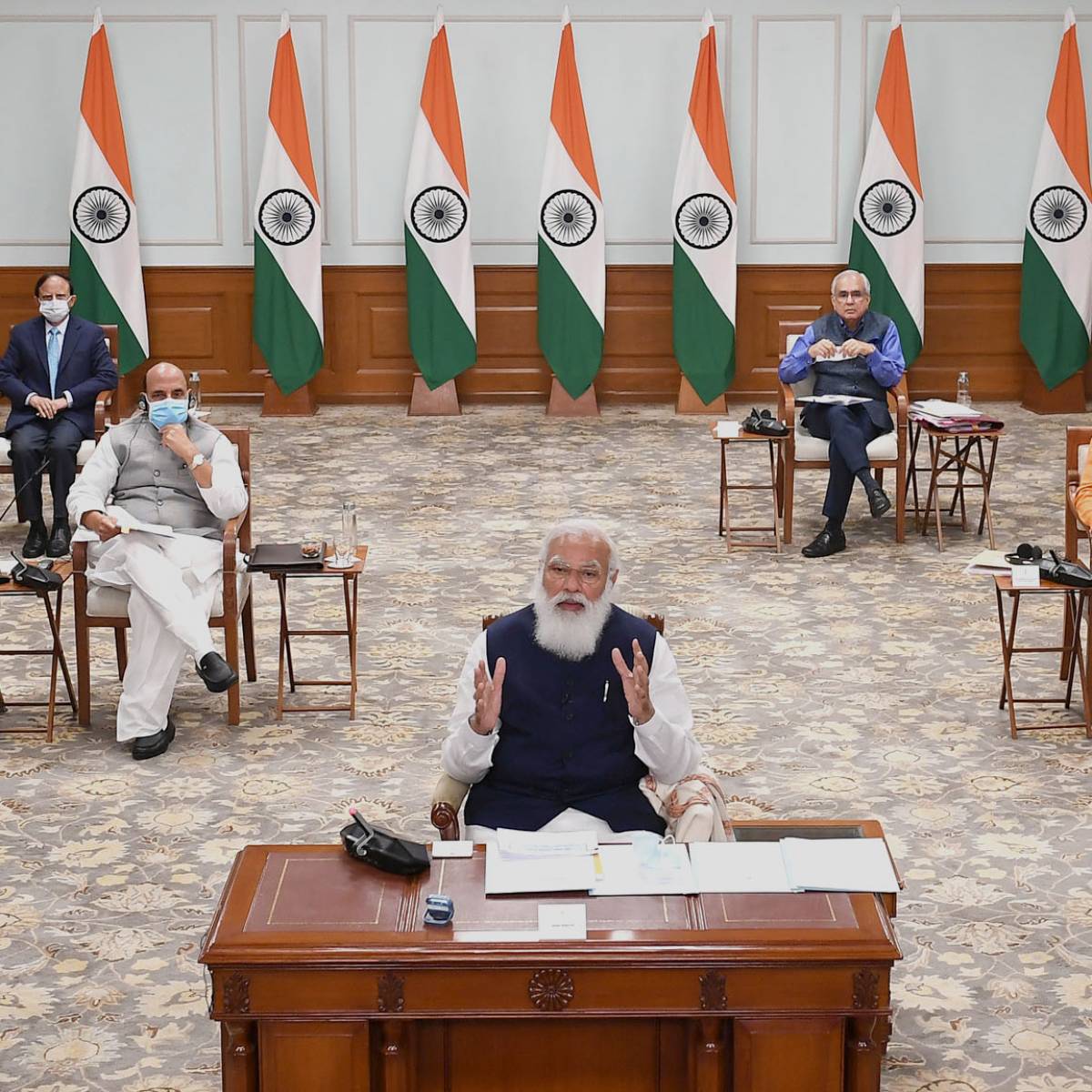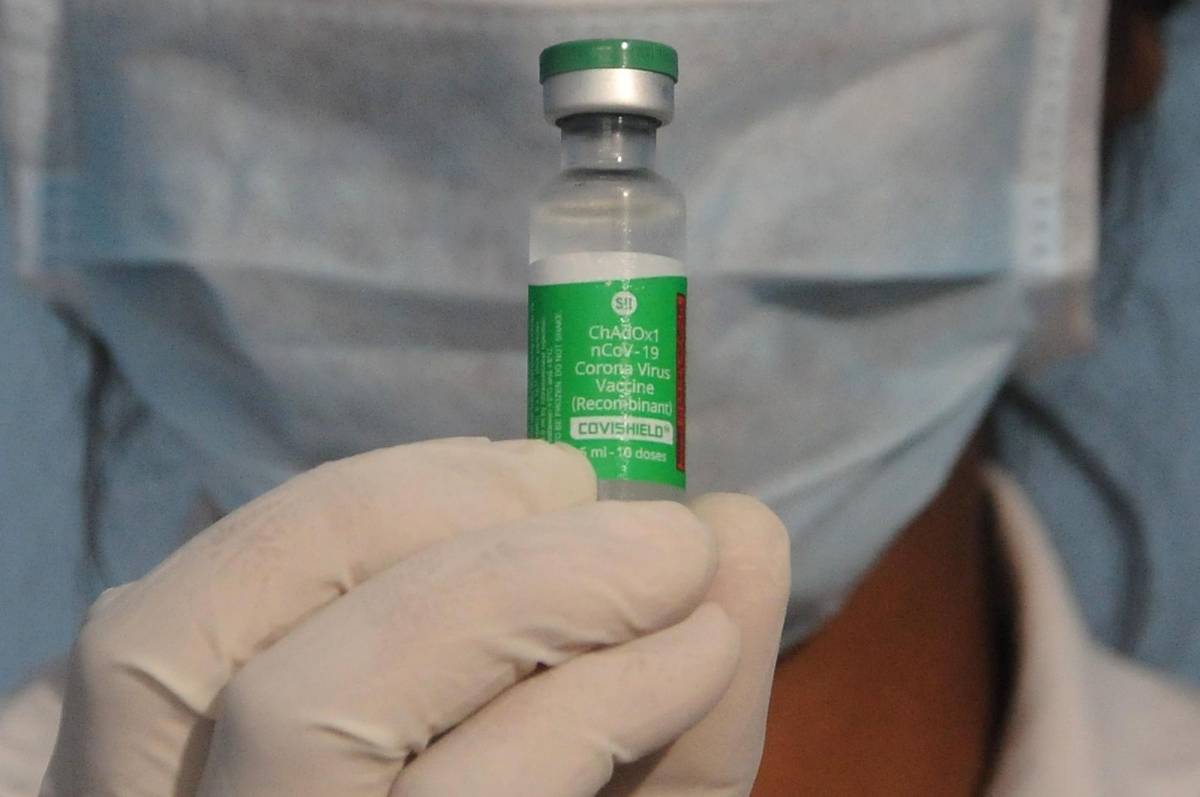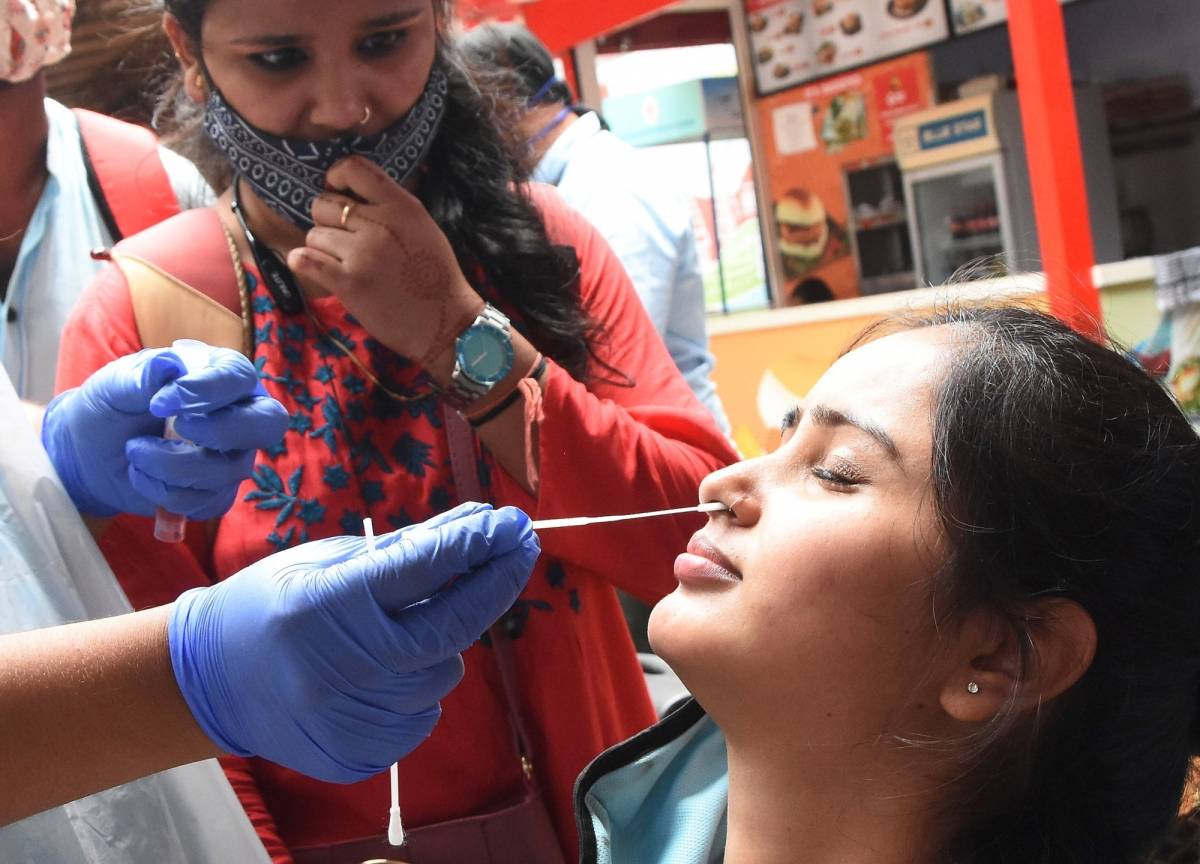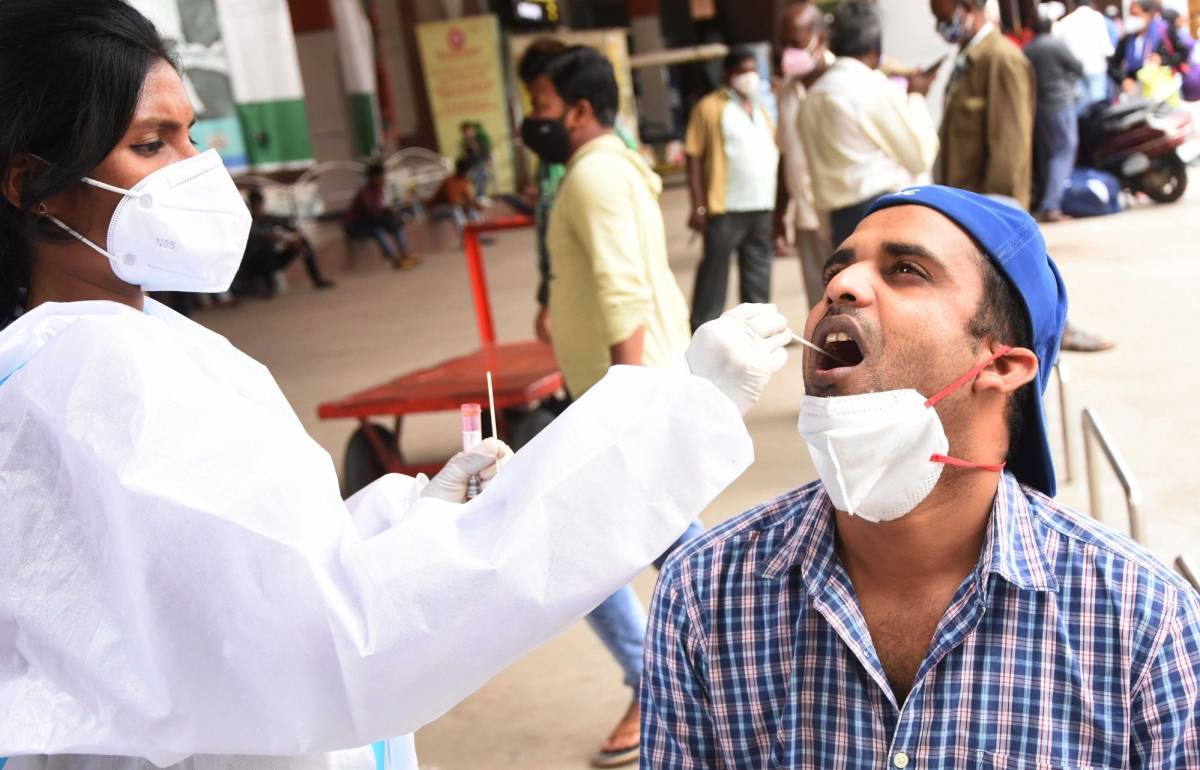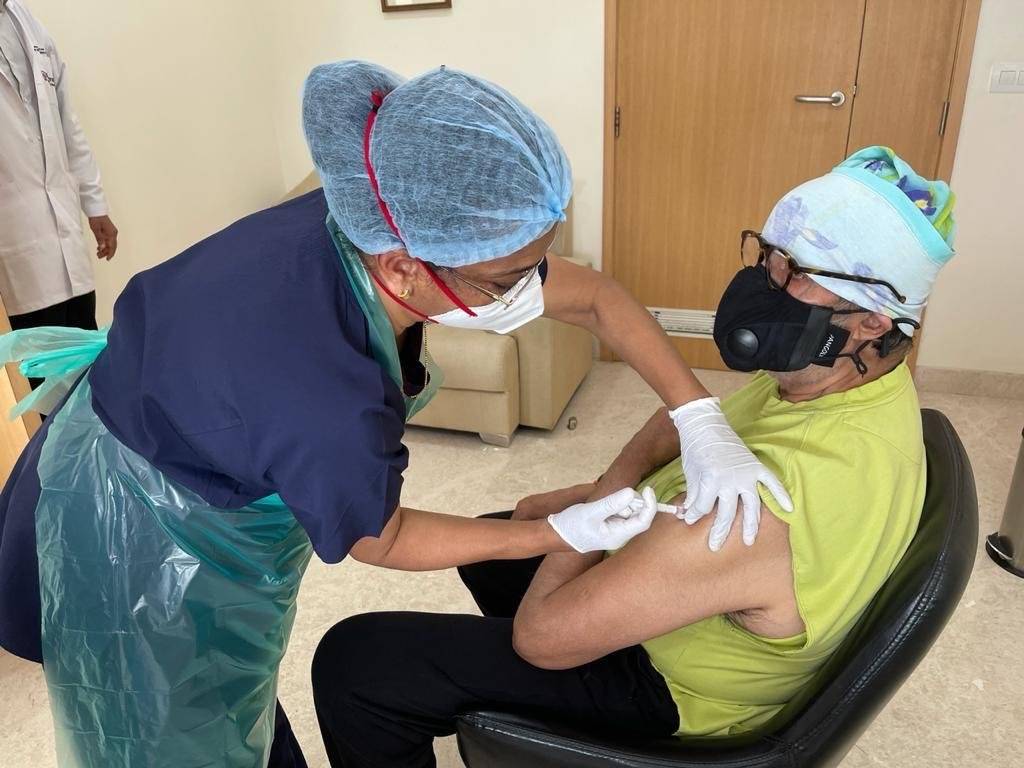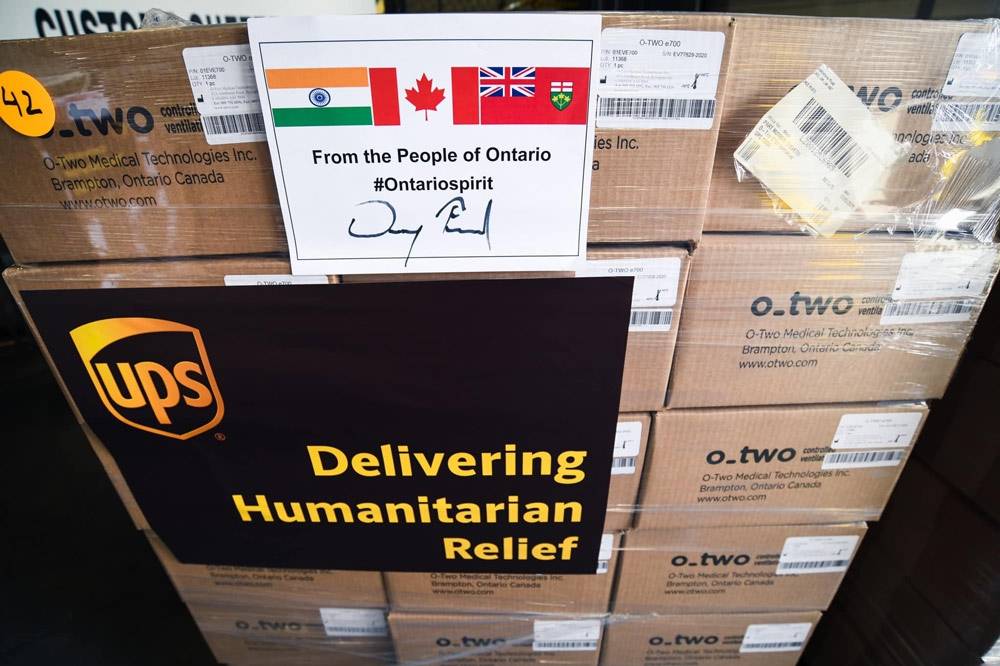This is the time to spend on people, not pander to Wall Street speculators by continuing with the Chicago School fiscal rectitude that ruined societies in South America in the 1970s, writes Prof. Madhav Nalapat

There have been substantive measures taken since the full force of the second wave of SARS2 hit India in February, and many are expected to show results within this year or the next. Rather than focus only on such recent actions, the Government of India needs to examine precisely why such measures were not taken early enough, in 2020. Had they been, much of the tragedy that has fallen on family after family would have been prevented. It was only after Prime Minister Narendra Modi intervened in March in the midst of his election tours that matters began to improve.
It is unlikely that there will be a rigorous effort at enforcing accountability within those whose lack of preparedness in 2020 for the scenario that unfolded in 2021 caused the shortage of oxygen, medicines and supplies that led to the deaths and misery of so many families across the country. The PM’s decision on 24 March 2020 to enforce a 21-day lockdown on the entire country at almost no notice (and which was followed by a similar national lockdown) was intended for a crisis-level expansion in hospital bed availability, and in the supply of the essentials needed to overcome the impact of the virus on vulnerable individuals.
SPECIALISTS NEEDED
The second wave has been far more deadly than the first, and its ferocity could have been anticipated, had specialist facilities such as the National Institute of Virology in Pune been placed at the heart of the central effort taken to meet the crisis caused by the present SARS2 spike. Specialisation in paediatric care or heart issues is essential for health, but in an epidemic so similar to SARS1, what was needed was full mobilisation of the best epidemiologists in India. Together with those from other specialisations, they needed to be present in each group tasked with framing policy to combat the pandemic.
Not that such avoidance of specialisations is an aberration. Officers who have spent decades in unrelated fields have been regarded from 1951 onwards as sufficient to take up leadership roles in specialist departments such as Defence or Home. In the complex world of the 21st century, administrative expertise by itself may not be sufficient for success in outcomes, nor can the domain knowledge needed for such success be picked up from a few briefings. More departments, including Health and Education, need to follow the example of the Department of Science & Technology and that of Atomic Energy by ensuring the embedding of domain specialists, especially at middle and higher levels. It would appear that a “doctor is a doctor, no matter what he is a specialist in”, seems to have been the belief while choosing the personnel who were chosen to manage the SARS2 task forces, empowered groups and regulatory authorities
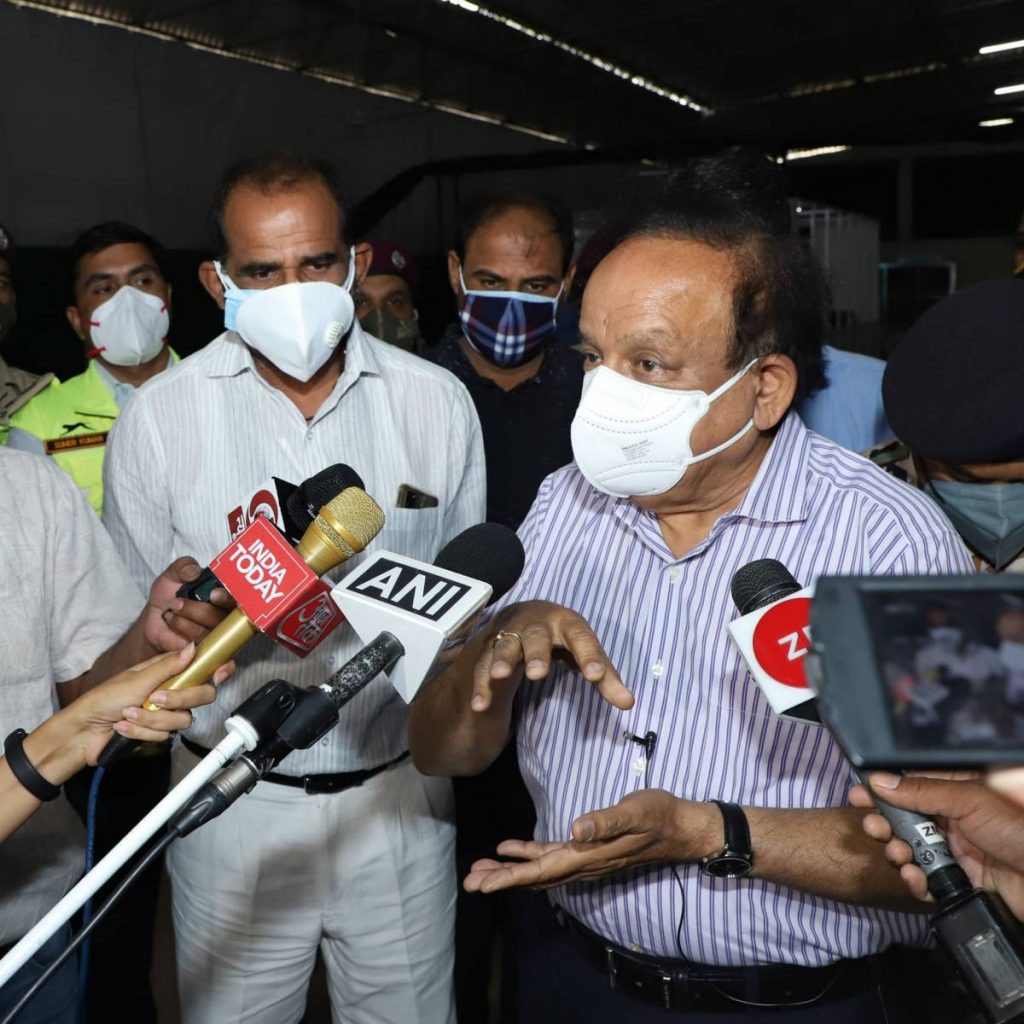
These were brought into operation during the start of the pandemic in 2020. What is needed is substantial expertise in the prevention and handling of epidemics, especially those of viral origin. There are several world class experts in this field in India. Judging by the reports featuring those prominent in government-appointed bodies, relatively few epidemiologists and specialists in viruses appear to have been tapped for manning SARS2 policy and monitoring groups.
What had been needed from early 2020 itself was to have ensured that longstanding regulatory and other obstacles got cleared. There needed to be decentralisation of oxygen production and supply in place of the cumbersome system involving a few big producers that has long been in operation in the country. The removal of regulatory blockages to expansion and decentralisation of oxygen supply took place only after the direct intervention of the Prime Minister six weeks ago. Similarly, there needed to be a trawl of companies operating in India that have the potential to make vaccines and therapeutics found to be helpful in battling SARS-2.
This seems to be taking place, but again, only after Prime Minister Modi’s March 2021 intervention, by which time the country was in crisis. Had those in the substantial machinery set up by the PMO in 2020 to manage the crisis anticipated problems and worked on improving the availability of the requisites for mitigation, such measures could have begun to be implemented in 2020 itself. There are complaints that medicines produced by domestic companies that showed promise in trials were ignored in favour of more expensive substitutes from abroad. Such reports need to be investigated. Unfortunately for Prime Minister Narendra Modi, 100% of the blame for the lack of preparedness is being placed at his door, not just in India but globally.
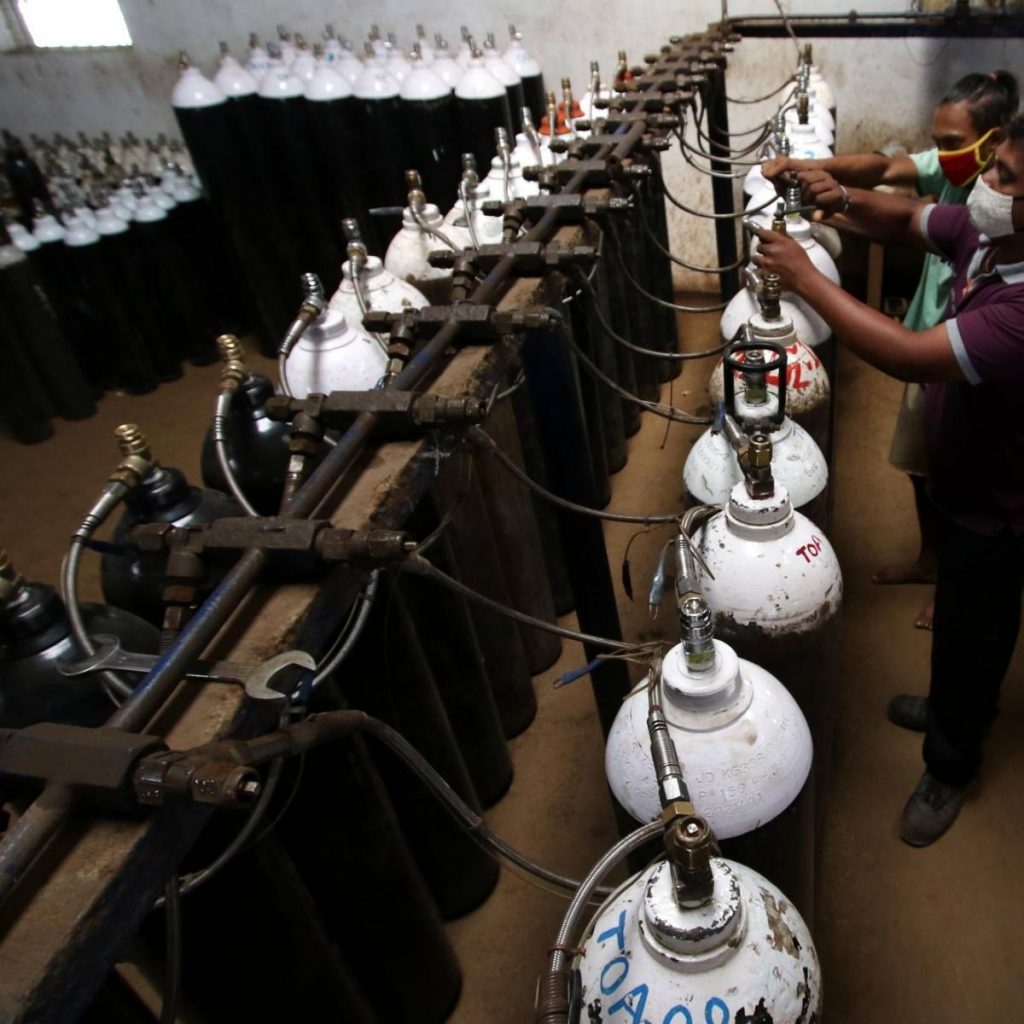
OBJECTIVE AND RESULT
Not for the first time, there has been a gap between what Prime Minister Modi wanted and what was in practice accomplished. There was sound logic behind the forced exchanging in 2016 of previous Rs 1,000 and Rs 500 notes with others. For too long, there had been recourse to currency paper and other requirements from foreign companies that were selling the same product to any country that paid the high price demanded, including Pakistan and entities linked to the PRC. Only recently, after the intervention of the PMO, have features been added to currency notes that make it more difficult to replicate. When demonetisation was announced by the Prime Minister in 2016, the country had been awash in counterfeit notes, which presumably was a factor behind this decision.
India is not Germany or Israel, and a substantial segment of the economy is tethered to cash. This segment suffered substantially because of the sudden drop in liquidity to near zero. The RBI should have made arrangements to ensure that liquidity was sufficient to prevent a liquidity cataclysm within the small and informal sector. Both sectors that are linked to enterprises much larger, and whose travails affected supply chains across a range of enterprises. It is not the Prime Minister’s job to ensure that banks get prepared on time to handle the flood of currency that would inevitably come to them once DeMo was announced. It was not the PM’s job to make sure that segments of the economy did not suffer on account of a sharp dip in liquidity consequent to the changeover to new notes. It was not his job to ensure that new notes were sent on time to banks and to ATMs across the country. These were the tasks of those lower down the chain of command. The Reserve Bank of India failed these essentials in such a manner that it became an object of ridicule across the world. Soon afterwards came the rollout of GST.
This was an essential reform, but needed to have been designed so as to ensure a quantum increase in overall growth. The initial GST structure was complex rather than simple, and those designing it added penal provisions that made compliance even more of a nightmare. Carrots were few, the stick substantial. Tax rates were complex and much too high, while exemptions given were much too low. North Block often forgets that the purchasing power of the rupee is not what it was in the 1970s. This needs to be kept in mind while designing exemption limits and cutoffs in its tax policies. The focus of the original design was on immediate revenue rather than on ensuring that the flow multiplies over a period of 3-5 years through growth-inducing features. That was the time needed for production and innovation to rise to the levels needed to meet the Prime Minister’s objective of a $5 trillion economy.
ALSO READ:EU nations urged to halt travel from India
Such an expansion will come about not because of government increasing its revenue (which objective has long been an obsession to many in the Finance Ministry) but because tax rates and regulation get pruned to levels that are less reflective of the permit-licence period. At the same time, there has too often been a genuflection of North Block and Mint Road to Wall Street .This has resulted in being tight-fisted while dealing with individuals and sectors where generosity was called for. In 2012, it was forecast in The Sunday Guardian that Narendra Modi would (on becoming Prime Minister) become the Deng Xiaoping of India, transforming the country. The sooner this becomes a reality, the better.

SPEND ON PEOPLE
In 2018, it was not a done deal that the BJP would come close to a Lok Sabha majority in the forthcoming Lok Sabha polls. Rahul Gandhi emerging as the Opposition alternative to PM Modi and the Balakot strike changed that. Sentiment prevailed in the form of anger at Pakistan and hope in a future led by PM Modi. These trumped the efforts of an opposition itself scarred by corruption charges to paint Modi in the same colours. It was true that the economy was slowing down, but it was expected that this would son be set right by PM Modi. During the current SARS2 second wave, fear has overshadowed hope for the future and anger at Pakistan.
Fear caused by the economic havoc caused to individual families by job losses and the impact on business of the pandemic. Fear that savings will be wiped out should the disease hit a family, at a time when it is affecting millions and draining away the savings of even the middle class. Fear of the future is everywhere, which is why calls for positivity (itself a sinister word in the lexicon of SARS2) are not falling on receptive ground. 2021 need not have begun on an unhappy note. It was suggested in *The Sunday Guardian* in 2020 that 5% of GDP get spent as additional expenditure on boosting jobs and incomes during the pandemic. The boost is not just for the year just past. The same increase in spending needs to take place in 2021 and 2022.
This is needed to ensure that the economy roars with double digit growth by 2023. The extra spending needed to be diverted to individuals and entities in such a manner that jobs were rescued and families were saved. As an example, had migrant workers been given a dole for at least six months through their bank accounts that compensated them for the loss in income because of lockdowns, that may have prevented millions from returning to their villages during that period. This is the time to spend on people, not pander to Wall Street speculators by continuing with the Chicago School fiscal rectitude that ruined societies in South America in the 1970s.
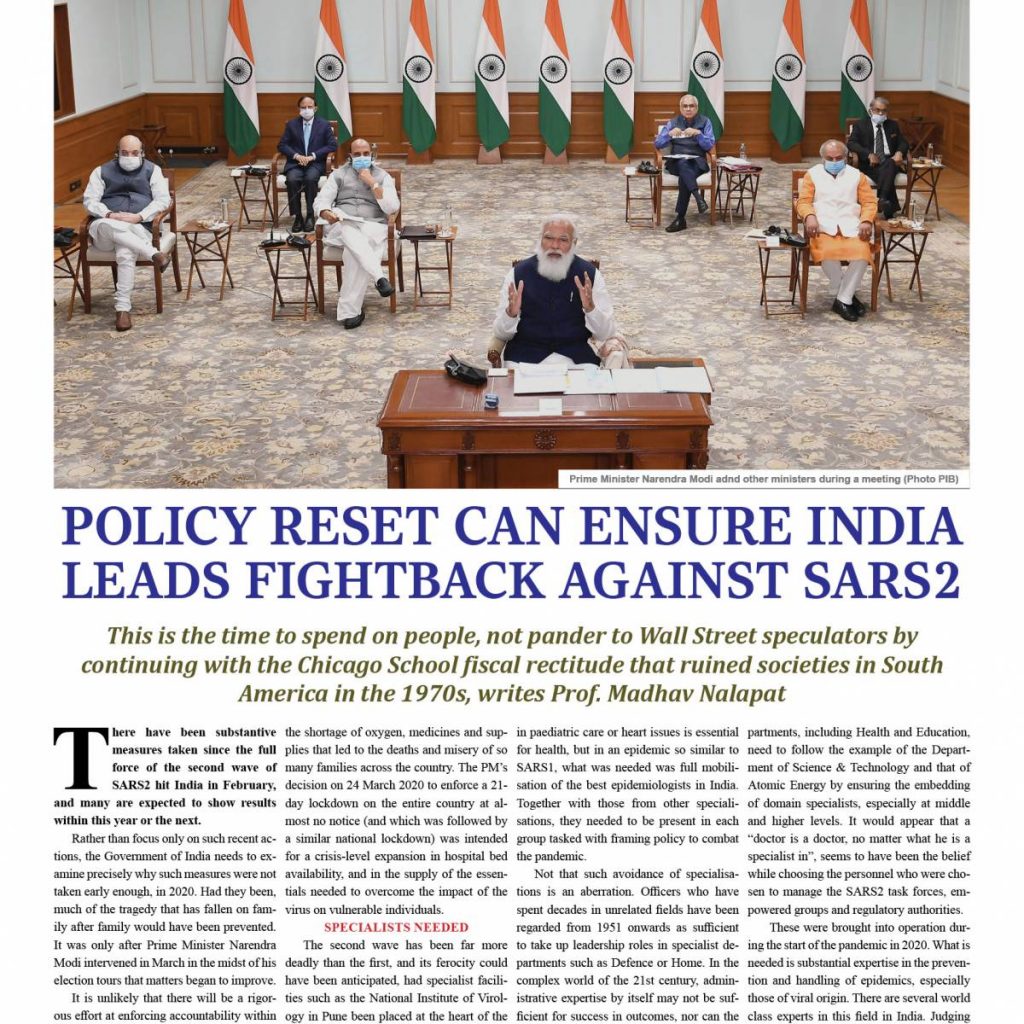
DIVERSIFY MEDICAL SUPPLIES
A back of the envelope calculation shows that India has several companies that have the potential to develop vaccines that will be as effective as any competitor. These include Cipla, Shanta Biotech, Biological E, Panacea Biotech, Hester Biosciences, and Zydus Cadilla, besides the three already in the ring (Bharat Biotech, Dr Reddy’s and SII). What were the bottlenecks that stopped the entry of more companies developing vaccines when the pandemic became visible in India in January 2020? It would appear from the records available that public funding for vaccine development in India has been low. And that bottlenecks to vaccine development by multiple companies that are a leftover of past practices were allowed to continue. This is being changed since March 2021, but could have been done in 2020 by the numerous task forces and empowered groups set up to handle the consequences of the pandemic.
ALSO READ:Armed forces spearhead India’s Covid battle
India being a country where doing nothing brings little censure, those involved in such lack of action during 2020 are likely to continue in their posts. Changes need to come if the confidence of the public is to be won back. Listening to a trove of statistics recited by an official when citizens are desperately searching for oxygen or medication may not result in a “positivity” boost in public sentiment. Especially when infections have reached levels not seen in the country till now. Regulatory changes would have ensured the dissemination of oxygen supply though smaller production units a year ago, and why this was not attempted at that point in time remains unclear. The situation is the same with therapeutics. Action needed to have been taken by the administrative machinery as soon as the Prime Minister alerted the nation in early 2020 that it was at war with a deadly pathogen. This would have mitigated the effects of the onset of a second wave.
DON’T WASTE TIME
Diplomats and other officials are preparing to conduct negotiations with the WTO on ensuring greater access to vaccines and medication helpful in the protection of citizens during a pandemic that has devastated societies across the world. Such negotiations may be a waste of time, as India already has the laws needed to ensure access to vaccines and medication, should it use those. There are TRIPS and WTO stipulations that an epidemic or a pandemic frees a country from the obligations it has entered into previous to such a disaster.
The Quad needs to ensure that a collective effort be made to escape dependence on the PRC for intermediate materials used in the production of drugs. It is self-destructive on the part of the PRC to continue to restrict access to these, as doing so would only speed up the shift of supply chains from that country. The Consul-General of India in Hong Kong has correctly flagged the extortionate prices being charged by Chinese producers of oxygen concentrators and other equipment. This has been going on for months at the very time when media outlets in China were talking of that country’s “generous assistance” to India. It has been pointed out that the core of each “Chinese” oxygen concentrator is made in Europe.
Why no action was taken during the start of 2020 itself to ensure that these were directly imported from Europe and manufactured in India remains unclear. The Prime Minister’s repeated calls to action need to be actioned on. The blame for such lack of preparedness and effort will fall on Narendra Modi and not on any other person, and this is already happening across the country. For everything going wrong, the blame is being placed on the Prime Minister, to the delight of his adversaries. They expect to coast to victory in subsequent elections because of such a situation, and their confidence is growing with every passing month. They expect that Bengal will not be a full stop but just a comma before other victories get chalked up.
DEVOLVE POWERS
Devolving more powers to state governments is a must. And corporates need to be given the freedom to procure vaccines from wherever they can find it, and ensure their staff are protected free of cost? Several private companies have a logistics chain for their items that is reliable, and these can be tapped to carry items essential in winning the battle against SARS2. Not only All of Government but All of India needs to be involved in the biological warfare that has been unleashed on the world’s most populous democracy. What needs to be done by the government is to mandate online transparency in (a) the receipt of funds, (b) the supply of vaccines and oxygen, and (c) availability of medication. Almost every day, complex graphs and charts are being rolled out by officials to the media.
These are too general and too opaque to have the effect of generating sufficient confidence within the public that the system is delivering results. There also needs to be transparency in goods that are being donated across the world. Rather than make efforts at centralisation that slow down the last mile delivery crucial to the saving of lives, what is needed is to reveal (i) which hospital, (ii) what equipment and (iii) from where it is coming from. Transparency will ensure efficiency rather than efforts to manage more than what the system can handle effectively.

NGOs CAN HELP, NOT HURT
The digital revolution promoted by Modi since he took charge of the country in 2014 needs to be used to ensure that information reaches the public, not everything going to some designated agency, and from then on, radio silence. Donors will multiply once they are certain that what they are giving is actually going to those in need. Curing a headache by cutting off the head has been Standard Operating Procedure in several departments since colonial times. Just as the entire bureaucracy cannot be put into the freezer because 5% of bureaucrats are corrupt, that 5% of NGOs are dodgy and have agendas that go against the national interest should not be a reason for slowing down certification and permissions for all of them.
It is not the job of government agencies to block, it is their responsibility to act as facilitators. The agencies would also ensure monitoring which separates the bad apples that get discovered in the course of their operations. Individuals and NGOs have done service during the pandemic in a manner that the world has seen and appreciated. Only a few NGOs need to be the targets of investigation and action. The rest should be allowed the freedom to operate. Restraint and restriction should be the exception and not the rule. In efforts to catch a crook, 99 individuals doing useful and honest work should not be prevented from doing so.
RAMP UP THERAPEUTICS
Therapeutics need to be ramped up in India, and it is expected that changes in administrative practice can ensure this. Many drugs found useful in dealing with the pandemic have expired patents, while others that are essential can be produced either through collaboration or on occasion, compulsory licensing. When a German pharma company sought to stop this from happening to a product in India, the courts stood by patients and not the patent. This avenue needs to be explored rather than avoided out of worry of the US Trade Representative.
The USTR under Biden is not what the USTR was under Trump, and it is unlikely that lifesaving measures will be blocked by the White House in the manner that was threatened during the period when Trump was in office. Should India produce drugs not only for itself but for the world (as policy resets can ensure), it would be difficult for even Switzerland or Germany to block such a situation, despite the influence of Big Pharma in those countries. Unlike what its detractors say, the Vaccine Maitri policy of the Modi government made sense, but needs to be combined with moves to ensure that bottlenecks to production of PPEs and other requisites get removed. ICMR and the Health Ministry need to be pro-active on this. Given the dismal record of the WHO during the pandemic, relying on that organisation for guidance on what to do is an invitation to disaster.
DUAL SYSTEM FOR VACCINATION
COWIN is a good system, except for the many millions too poor to access the internet. A dual system has been suggested by a health specialist based in Japan, Dr Sunil Chacko. This is that those too poor to have access to the internet should be given the right to walk in to vaccination centres kept for them. Others could schedule appointments through their smartphones. Once more companies in India are enabled through policy resets to increase the production of vaccines, India can produce around 4 billion SARS2 vaccines annually within the next two years, and be able to vaccinate the world. India can equally well produce low-cost therapeutics effective against the disease and send them across the world, as is happening in the case of HIV-AIDS. 2020 was a year of missed opportunities. 2121 needs to be the year of the Great Reset.


